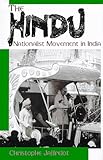The Hindu nationalist movement in India
Publication details: New York Columbia University Press 1956Description: 592pISBN:- 9780231103343
- 324.254000 JAF
| Item type | Current library | Shelving location | Call number | Status | Date due | Barcode |
|---|---|---|---|---|---|---|
 BOOKs
BOOKs
|
National Law School | Mansfield Section | 324.254 JAF (Browse shelf(Opens below)) | Not For Loan | 32856 |
Description:
Although the peaceful, inward-looking doctrine of the Hindu religion hardly seems to lend itself to ethnic nationalism, a phenomenal surge of militant Hinduism has taken place over the last ten years in India, precipitating a wave of Hindu-Muslim riots in India in the late 1980s and early 1990s. Indeed, the electoral success of the Hindu nationalist Bharatiya Janata Party (BJP) has proven beyond a doubt that these fundamentalists now pose a significant threat to India's secular government.
In a historically rich, detailed account of the Hindu nationalist movement in India since the 1920s, Christophe Jaffrelot explores how rapid changes in the political, social, and economic climate have made India fertile soil for the growth of the primary arm of Hindu nationalism, a paramilitary-style group known as the Rashtriya Swayamsevak Sangh (RSS), together with its political offshoots.
Jaffrelot argues that political uneasiness, created by real and imagined threats of colonialism and the presence of minority groups, paved the way for militant Hinduism on the Indian subcontinent. He shows how the Hindu movement uses religion to enter the political sphere, and argues that the ideology they speak for has less to do with Hindu philosophy than with ethnic nationalism, borrowing from modern European models. Using techniques similar to those of nationalist groups in other nations, Jaffrelot contends, the Hindu movement polarizes Indian society by stigmatizing minorities - chiefly Muslims and Christians - and by promoting a sectarian Hindu identity.
Jaffrelot's close empirical research informs his case studies of party-building at the local level and strengthens his incisive interpretations of the past failures and Hindu nationalism, as well as recent successes beginning in the 1980s. This analysis takes into account the subtle interaction between long-term strategies for changing a country's culture and short-term tactics of political accommodation.

There are no comments on this title.